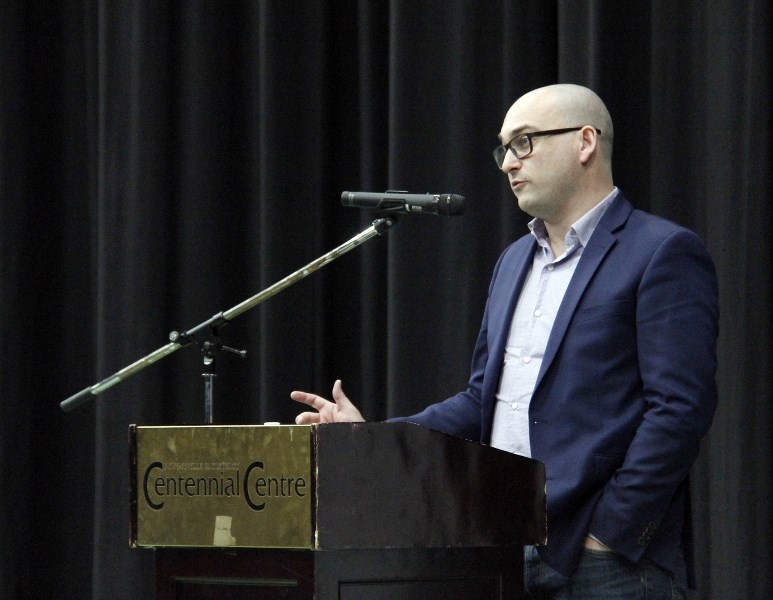The Canadian Association of Petroleum Producers (CAPP) is encouraging local industry leaders to share their thoughts on the proposed methane reduction regulations.
The Bonnyville and District Chamber of Commerce put the oil and gas industry in the spotlight on Wednesday, Dec. 6, with an information session about proposed regulations for methane emissions, their impacts on local industry, and how companies can have their say.
“We just wanted to bring light to some information about what is happening and provide industry's point of view on the situation, because industry is on board with the 45 per cent reduction by 2025, but they have an alternate solution on how to achieve that reduction,” expressed Tanya Oliver, executive director for the local chamber. “This was a good opportunity for us to bring CAPP and share information and get the word out there on what people can do to help, and make their voice heard as well.”
Chris Montgomery, manager of communications and outreach for CAPP, explained how some industry leaders have started thinking outside of the box when it comes to efficiencies in production, all with the goal of adjusting to the ”new reality.”
This included the loss of over 50,000 jobs in the oil and gas industry since the last peak in Alberta in 2014.
“Although some communities in Alberta have started to turn around, and there is an increase in activity levels, others, mostly in the southern part of the province, aren't seeing that because they have resources that are just not economic in today's reality,” Montgomery explained.
Moving forward, it's important for industry to focus on remaining competitive against their southern counterparts in the United States, he continued.
Currently in the US, production levels remain high. A recent tax bill in Congress could mean corporate taxes are expected to be lower and environmental regulations are being withdrawn.
“They're making it a lot easier for businesses,” expressed Montgomery, adding that is not the direction the Government of Canada or Alberta is interested in taking.
However, CAPP isn't suggesting the country or province follow the United States' lead. Instead, they ask that both levels of government take a step back and find a better way to help industry meet the methane gas emission reduction regulations.
“The question isn't whether we should or shouldn't protect the environment, the question is how,” said Montgomery. “We want to make sure that we do it in a way that allows for business to grow in Alberta.”
The policy would see a reduction of methane emissions from the gas industry by a total of 40 to 45 per cent by 2025.
Montgomery said there are two major areas of impact. The first is conventional natural gas. The second, which will have more of an impact on the northern areas of the province, deals with cold or heavy oil development.
“It's important that we get it right for business, because it will have a negative economic impact if we don't. If the existing facilities or potential new facilities are not economic with this additional cost added by government, industries will have to make the difficult decision on whether or not to proceed with their projects, or possibly shut existing ones down,” he explained.
The environment can also take a hit if the regulations aren't integrated properly. If targets become too much for businesses, they will begin shutting down their Alberta operations.
“That demand for heavy oil will be met by the marketplace, and it will be met by places where they don't have climate policy and they don't produce their oil as well as we do here,” continued Montgomery.
That isn't all that the CAPP is advocating for on behalf of industry. Another concern is approval timelines.
Using a local project as an example, Montgomery explained how a delay in approval because of statements of concern could drive businesses away.
“I know some major projects in this area have seen significant delays. In Alberta, if you're trying to drill a gas well, for example, and a statement of concern is raised, it can take up to 100-days longer to get an approval in Alberta than anywhere else in North America,” he explained.
The CAPP is having discussions with the Alberta Energy Regulator about their concerns and recommendations on methane gas emissions regulations and Alberta's Climate Leadership Plan.
So far, they have created an Output-Based Allegations (OBA) program with the provincial government, which will take affect Jan. 1.
“What the OBA system is, is it creates a top-performer benchmark for large emitters. Any facility that doesn't emit that much will receive a credit, while any facility that emits more will have to pay in some way,” explained Colleen Houston, manager of oil sands communications for CAPP, adding the details will be announced over the next few weeks.
In 2014, over 10,800 wells were drilled across western Canada. This was the last peak for Alberta.
Two-years later, industry has drilled about one third of that, with about 3,700 wells.
In 2017, CAPP is projecting 7,200 wells, with a drop expected in 2018.
“We're actually projecting lower drilling in 2018 than we're seeing in 2017, in spite of the fact that we have higher prices, we're projecting 6,800 wells in western Canada,” Montgomery said.
He reiterated that although industry is showing some discontent with the methane gas emissions regulations, it's not about why it's being done, but how.
“It's not just industry that will be impacted, as much as the environment will be impacted, communities will also be impacted. It's important the governments hear that.”



